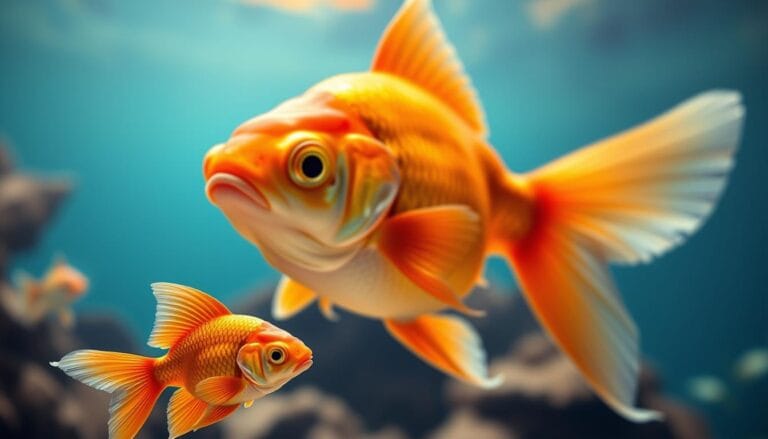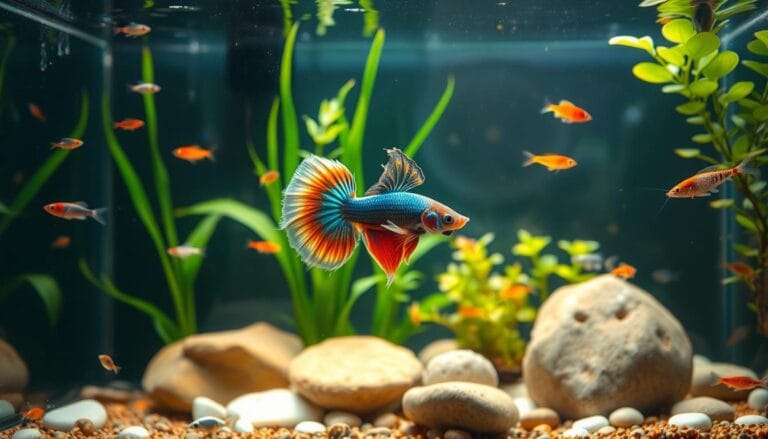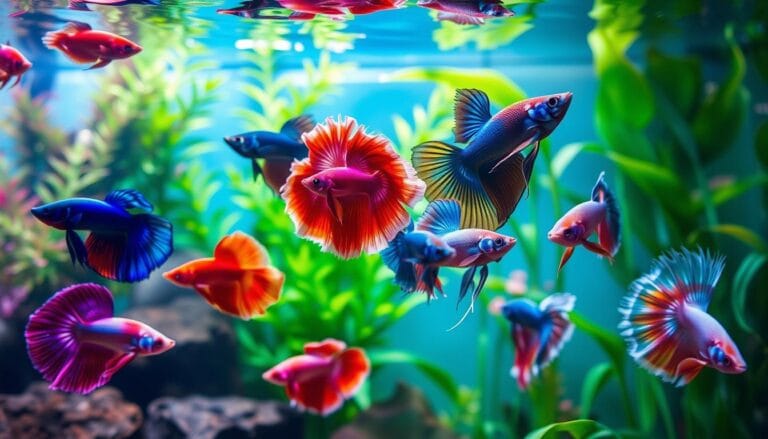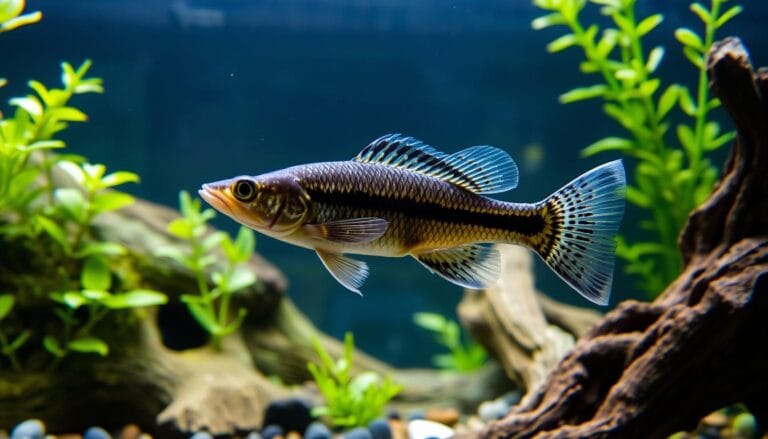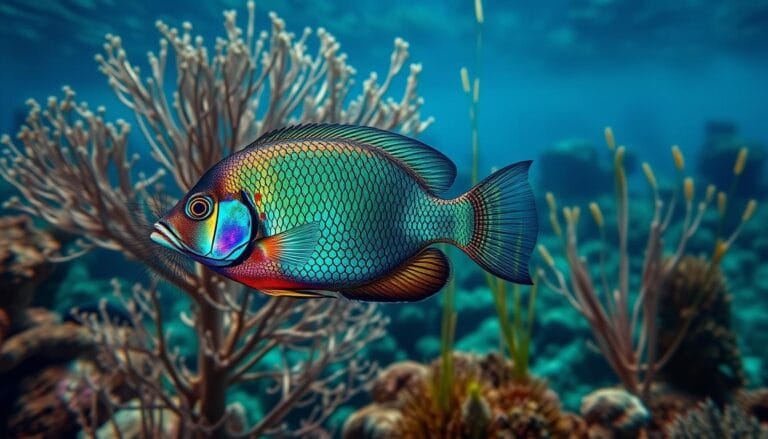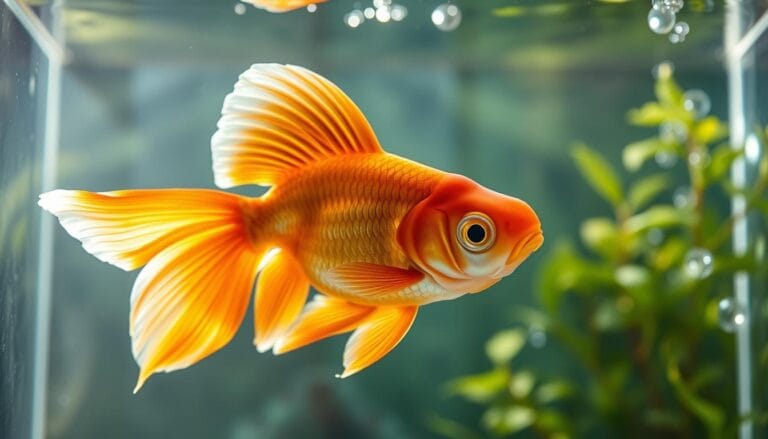How Long Can a Betta Fish Go Without Food? Discover the Facts & Tips
As a betta fish owner, you might wonder how Long Can a Betta Fish Go Without Food. This is a big worry, like when you’re going on vacation. Betta fish can last up to 14 days without eating if they’re healthy. But, it’s best not to leave them unfed for more than 5-6 days.
Knowing how long a betta fish can go without food is key to their care. You need to understand their eating habits and nutritional needs. This knowledge helps you prepare for when you’re away.
Table of Contents
Key Takeaways
- Healthy adult betta fish can go without food for up to 10-14 days.
- Young or sick betta fish can only go without food for approximately 3-5 days.
- It is recommended to provide 4-6 pellets per day for feeding when a caregiver is involved.
- Betta fish should not be left without food or supervision for more than a week to prevent health complications.
- Understanding what do betta fish eat and their feeding frequency is essential for their care.
- How long can a betta fish go without food depends on their age, health, and environmental conditions.
- Regular water changes and proper feeding are key to keeping your betta fish healthy.
Understanding Betta Fish Feeding Habits
To figure out how often to feed a betta fish, knowing their natural eating habits is key. In the wild, they eat insects and larvae. But, domesticated betta fish depend on us for their meals. Their metabolism and digestion help decide how often they need to eat.
Betta fish can only eat a little because their stomach is small, like a single eyeball. They do best in water between 75-84°F. Warmer water means they need more food than cooler water.
Natural Feeding Patterns
In the wild, betta fish can go days without eating. But, in our homes, they should eat once to three times a day. This keeps them healthy and happy.
Metabolism and Digestion
Betta fish can skip meals for up to 3 days without getting sick. But, it’s good to feed them regularly. This ensures they get the nutrients they need.
Wild vs. Domestic Feeding Behaviors
In the wild, betta fish fast based on their surroundings. In our homes, we should try to mimic their natural eating habits. Knowing how often to feed them helps us care for them better.
How Long Can a Betta Fish Go Without Food
Understanding how long your betta fish can live without food is key to their health. The time frame depends on their age, health, and environment. A healthy adult betta can go without food for 10-14 days. But, it’s not good to leave them unfed for that long.
Long fasting can stress them out, weaken their immune system, and make them sick. It’s important to feed them regularly but not too much. Regular feeding with high-quality food helps keep them healthy. Use automatic feeders but set them right to avoid too much food.
Here are some key points to consider when determining how long your betta fish can go without food:
- A healthy betta fish can survive without food for about 10-14 days.
- Extended periods without food can lead to significant stress and lowered immune defenses.
- A fasting period of 1 to 2 days can be beneficial for bettas suffering from conditions like bloating.
- Failure to feed betta fish for prolonged periods can result in lethargy, weakness, and eventual death.
Betta fish can live without food for different lengths based on their age, health, and environment. Older bettas can go longer without food because they have more fat and a slower metabolism. Knowing how long your betta can go without food helps you care for them better.
Signs Your Betta Fish is Hungry
As a betta fish owner, knowing when your fish is hungry is key. Understanding their eating habits is important. This is true, even when you’re away on vacation.
When your betta fish is hungry, you might see them moving more. They could also look like they have a big belly or have clear eyes. If they’re not as active as usual, it’s time to feed them.
Behavioral Changes
Here are some signs your betta fish is hungry:
- They swim more than usual.
- They look for food around the tank.
- They seem restless or agitated.
Physical Indicators
Here are physical signs your betta fish is hungry:
- They have a big tummy.
- They have clear eyes.
- They have a swollen belly.
By watching for these signs, you can keep your betta fish happy and fed, even when you’re away. Make sure to arrange for someone to feed your betta fish while you’re on vacation. This way, you can be sure they’re getting the best food.
Essential Nutrients for Betta Fish Health
When thinking about what do betta fish eat, it’s key to give them a balanced diet. This diet should be rich in protein, vitamins, and minerals. Betta pellets are a great choice because they’re made to meet betta fish’s nutritional needs.
You can also add frozen or live foods like brine shrimp or bloodworms. This variety ensures they get all the nutrients they need.
Some important nutrients to focus on include:
- Protein: essential for growth and development
- Vitamins: vital for healthy skin, fins, and scales
- Minerals: needed for good digestion and overall health
Remember, overfeeding can harm your betta fish. Feed them 1-2 times a day, with portions that match the size of their eyeball.
By giving your betta fish a balanced diet with various nutrient-rich foods, they’ll stay healthy and thrive. Always research and understand what do betta fish eat to make the best care decisions for them.
Optimal Feeding Schedule for Betta Fish
It’s key to find the right feeding schedule for your betta fish. Knowing how often to feed them is important for their health. Adult betta fish need 1-2 meals a day, while younger ones might eat up to 3 times a day.
It’s important to know how much to feed your betta fish. An adult betta should get about 1.8 grams of food daily. You can give them one full portion or two half portions. Make sure the food has at least 30% protein, as it’s best for betta fish.
Daily Feeding Guidelines
When you feed your betta fish, give them 2-3 pellets or a small amount of flakes. For frozen foods, cut cubes into quarters. Live foods are okay 1-2 times a week, but they can carry diseases.
Portion Control Tips
- Feed 1-2 times a day for adult betta fish
- Feed up to 3 times a day for young betta fish
- Provide 2-3 pellets per meal
- Offer a small pinch of flakes per meal
By following these tips, you can keep your betta fish healthy and happy. Watch for signs of illness and adjust their diet if needed.
Common Feeding Mistakes to Avoid
Feeding your betta fish right is key. Overfeeding is a big no-no, as it can pollute the water and harm your fish. Knowing how often do betta fish eat helps avoid this. Feed them 2 to 4 pellets, once or twice a day.
Not giving them a varied diet is another mistake. This can lead to nutritional problems. If you’re going on betta fish feeding on vacation, don’t overfeed before you leave. Experts say not to add extra food, as it can pollute the water or cause overfeeding.
Here are some key points to keep in mind:
- Feed your betta fish 2 to 4 pellets once or twice per day
- Avoid feeding your betta fish excessively before leaving for vacation
- Provide a varied diet to prevent nutritional deficiencies
Betta fish can go 14 days without food, but regular feeding is best for their health. By avoiding these mistakes, you can keep your betta fish happy and healthy.
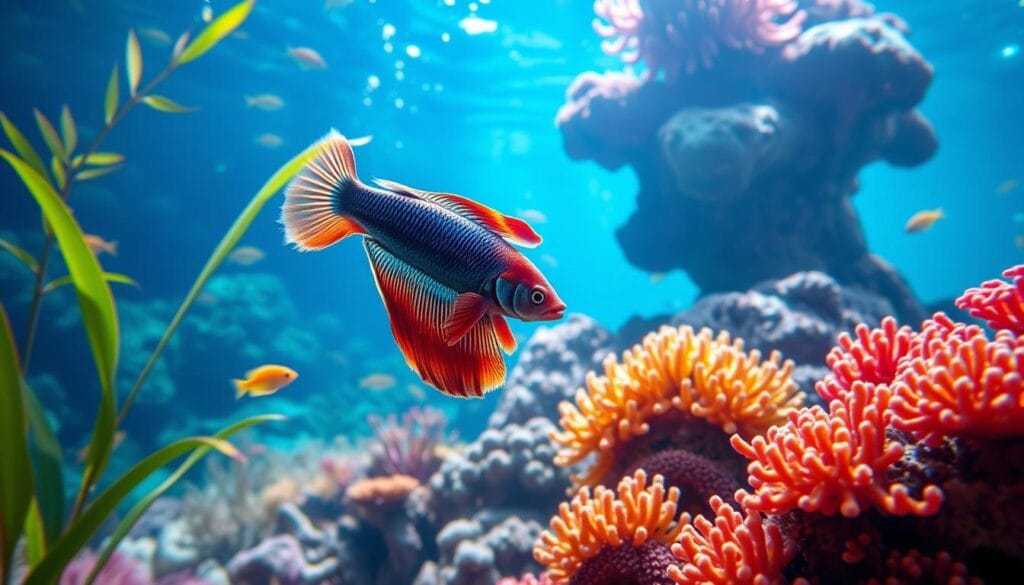
Preparing Your Betta Fish for Your Absence
Planning a vacation means thinking about your betta fish’s health. If you’ll be away for a while, you need to get your fish ready. This includes betta fish feeding on vacation, as they can live without food for a bit. Healthy adult betta fish can last 10-14 days without eating, but they need food to stay healthy.
To get your betta fish ready, you can ask a friend or family member to feed them. For longer trips, an automatic fish feeder is a good choice. These feeders give your fish regular meals, keeping them happy and healthy while you’re away. Knowing how long can betta fish live without food helps you plan the best care for your pet.
Short-Term Solutions
- Ask a friend or family member to feed your betta fish
- Provide detailed instructions on feeding schedules and amounts
- Ensure your betta fish has a clean and well-maintained tank environment
Long-Term Feeding Options
For longer trips, think about getting an automatic fish feeder. These feeders give your fish regular meals, keeping them happy and healthy. Make sure to set it up right and check it every day to make sure it works.
Automatic Feeders Guide
When picking an automatic feeder, think about your tank size and fish number. It’s also key to follow the maker’s setup and care tips. With a reliable food source, you can relax on your vacation, knowing your fish is well taken care of.
Emergency Feeding Solutions
When you’re away unexpectedly, it’s key to have a plan for your betta fish’s food. Betta fish can live without food for a while, but it’s not good to do it often. How long can betta fish go without food is a big worry for many owners. They can go 10 days to 2 weeks without eating, but it shouldn’t happen often.
In emergencies, think about asking a friend or family to feed your fish. Or, get an automatic feeder. Knowing what do betta fish eat is important for their health. A high-quality betta food with protein sources like fish meal and shrimp meal is best.
Some important things to think about for emergency feeding include:
- Test the automatic feeder to avoid overfeeding
- Do a 50% water change before leaving your betta fish alone
- Keep an eye on the water temperature and maintain a stable day/night cycle
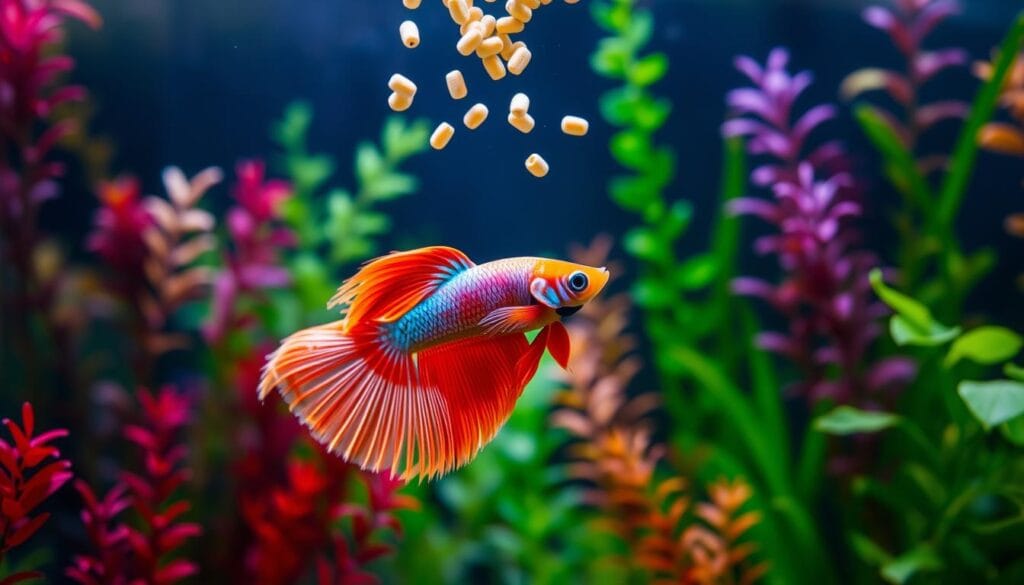
Having a plan and knowing your betta fish’s needs helps keep them healthy, even in emergencies. Always put your betta fish’s nutrition first and keep their environment stable to prevent stress and sickness.
Impact of Water Temperature on Feeding Requirements
When thinking about how often to feed betta fish, remember the water temperature’s role. The temperature affects their metabolism and how much they eat. In warmer water, they need to eat more often.
This is key when you’re away and need to plan for feeding. You must make sure your fish gets enough food.
Betta fish do best in water between 76°F and 82°F. If it gets hotter than 82°F, they need more food. If it gets colder than 76°F, they eat less. Knowing this helps you feed them right.
Seasonal Adjustments
Seasonal changes mean you might need to change how often you feed your betta fish. In summer, they eat more because the water is warmer. In winter, they eat less because it’s cooler.
Temperature-Related Behavior Changes
Water temperature also changes your betta fish’s behavior and how hungry they are. If the water is too hot or cold, they might not want to eat. By watching the temperature and adjusting their food, you keep them healthy and happy, even when you’re away.
Special Dietary Considerations for Sick or Aging Bettas
As a betta fish owner, it’s key to think about your pet’s diet, more so if it’s sick or getting older. What do betta fish eat is often asked, and they need a diet full of protein. Their food should have at least 45% protein for them to stay healthy.
When wondering how long can betta fish live without food, the answer changes based on the fish’s health and its environment. But, research shows bettas can survive about 3-5 days without eating. For sick or older betta fish, it’s important to give them a varied diet. This might mean feeding them more often or using different types of food.
Some important things to remember for sick or aging betta fish include:
- Providing a balanced diet that meets their nutritional needs
- Ensuring access to clean, fresh water
- Maintaining a stable water temperature between 76-81 degrees Fahrenheit
By following these tips and considering your sick or aging betta fish’s special needs, you can help them get the nutrients they need. This can aid in their recovery or help them stay healthy.
Conclusion: Ensuring Your Betta’s Nutritional Well-being
Keeping your betta fish healthy and vibrant is key. Knowing how long they can go without food helps. This ensures they get the right diet, even when you’re not there. Regular meals, a varied diet, and a clean home are vital for their happiness.
Going on vacation or needing to leave? Make sure your betta is fed and cared for. Use automatic feeders, ask a pet sitter, or set up a feeding schedule. This way, your betta stays healthy and happy, ready to brighten your life.
With the right knowledge, you can give your betta the best food for their health. Follow this guide to keep your betta well-fed and beautiful. Enjoy their stunning beauty for many years to come.
FAQ
What do betta fish eat?
In the wild, betta fish eat insects and larvae. At home, they need a diet rich in protein and vitamins. This includes betta pellets and live foods like brine shrimp or bloodworms.
How long can betta fish live without food?
A healthy betta fish can go 10-14 days without eating. But, it’s not good to leave them unfed for so long. It can make them stressed and sick.
How often should you feed a betta fish?
Feed adult betta fish 1-2 times a day. Young ones might need food up to 3 times a day. Make sure not to overfeed, as it’s bad for their health.
How often do betta fish eat?
Betta fish in warmer water need to eat more often. This is because their metabolism changes with temperature. Knowing this helps you care for them better.
How can I prepare my betta fish for my absence?
For short trips, ask someone to feed your betta. For longer times, get an automatic fish feeder. It will feed your betta while you’re away.
There are no reviews yet. Be the first one to write one.


